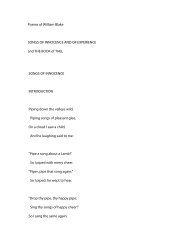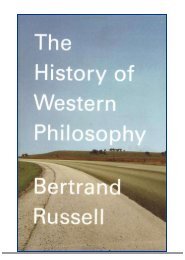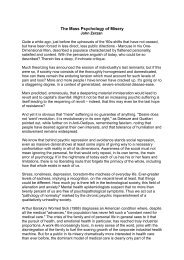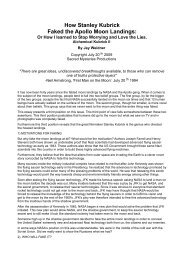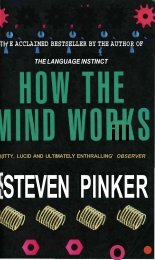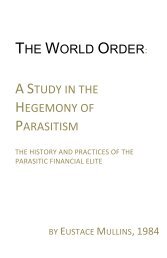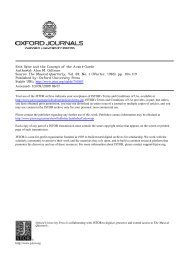While plumbing the hidden depths of the word roots, we will have to beconstantly mindful of connections forgotten by contemporary man. Anyattempt to probe this region is likely to unleash a negative reaction inpresent-day man, since such insights into the shadowy depth areunsettling; they remind him too much of the dark depths which he doesnot yet dare to acknowledge in himself. Yet it is perfectly permissibletoday, and to some degree indispensible, to think symbolical whiledescribing symbolic processes. If we insist an such symbolic thinking,however, one precept must be observed: as far as possible we mustpossess an insight into the particular symbol; that is, we must be certainand aware of the symbolism involved. If we are not, we lose our selfassuranceand become victims of the symbol, captive to an unknownpower that controls us according to its will. We would expressly warn hereof such psychic violation by the symbol, as well as of the psychic bondagethat results from an inadequate awareness and knowledge of symbolicthinking.Let us, however, return to the question of perspectivity. We have notedthat perspective is the pre-eminent expression of the emergentconsciousness of fifteenth-century European man, the palpable expressionof hisobjectivation of spatial awareness. Besides illuminating space,perspective brings it to man's awareness and lends man his own visibilityof himself. We have also noted that in the paintings of Giotto and Masacciothis evident perception of man comes to light for the first time. Yet thisvery same perspective whose study and gradual acquisition were a majorpreoccupation for Renaissance man not only extends his image of theworld achieving spatialization but also narrows his vision - a consequencethat still afflicts us today.Perspectival vision and thought confine us within spatial limitations.Elsewhere we have alluded to the antithesis inherent in perspective: itlocates and determines the observer as well as the observed. <strong>The</strong> positiveresult is a concretion of man and space; the negative result is therestriction of man to a limited segment where he perceives only onesector of reality. Like Petrarch, who separated landscape from land, manseparates from the whole only that part which his view or thinking canencompass, and forgets those sectors that lie adjacent, beyond, or evenbehind. One result is the anthropocentrism that has displaced what wemight call the theocentrism previously held. Man, himself a part of theworld, endows his sector of awareness with primacy; but he is, of course,only able to perceive a partial view. <strong>The</strong> sector is given prominence overthe circle; the part outweighs the whole. As the whole cannot beapproached from a perspectival attitude to the world, we merelysuperimpose the character of wholeness onto the sector, the result beingthe familiar "totality."It is no accident that the ambivalence inherent in the (Latin) primal wordtotusis evident in the word "totality." Although in more recent times theword totushasmeant "all" or "whole," it would earlier have meant"nothing." In any event, theaudial similarity between totus and [German]20
tot, "dead," is readily apparent. But let us forget the totality with itsnefarious character; it is not the whole. Andalthoughthe whole can nolonger even be approached from the perspectival position, thewhole, aswe shall see further on, is again being approached in novel ways from theaperspectival attitude.Perspectivation, let us remember, also includes a reduction; and thisreductive nature is evident, for instance, in perspectival man'spredominantly visual or sight orientation in contrast to unperspectivalman's audial or hearing orientation. <strong>The</strong> basis of the perspectival worldview is the visual pyramid; the two lines extend fromthe eyes and meet atthe object viewed. <strong>The</strong> image formed by the isolated sector includes thesubject, the object, and the space in between. Pierodella Francesca clearlyexpresses this in his remark: "<strong>The</strong> first is the eye that sees; the second,the object seen; the third, the distance between the one and the other."On thisPanofsky comments: "It [perspective] furnished a place for thehuman form to unfold in a life-like manner and move mimically[which isequivalent to the discovery of space]; but it also enabled light to spreadand diffuse in space [the illumination of space is the emergence of spatialawareness] and permitted considerable freedom in the treatment of thehuman body. Perspective provides a distance between man and objects."Such detachment is always a sign of an emergent objectifyingconsciousness and of the liberation of previously innate potentialities thatare subsequently rediscovered and realized in the outer world.This example again suggests to what extent perspective is the mosttangible expression of an entire epoch. <strong>The</strong> basic concern of perspective,which it achieves, is to "look through" space and thereby to perceive andgrasp space rationally. <strong>The</strong> very word "perspective" conveys this intent, asDürer suggests: "Besides,perspectiva is a Latin term meaning `seeingthrough." It is a "seeing through" of space and thus a coming to awarenessof space. It is irrelevant here whether we accept Dürers interpretation andtranslate perspicere(from which perspectiva derives) in his sense as"seeing through," or render it, with Panofsky, as "seeing clearly." Bothinterpretations point to the same thing. <strong>The</strong> emergent awareness ofdistantiating space presupposes a clear vision; and this heightening ofawareness is accompanied by an increase of personal or egoconsciousness.This brings us back to our thesis about the antithetical nature ofperspective; it locates the observer as well as the observed. Panofsky toounderscores this dualistic, antithetical character: "<strong>The</strong> history ofperspective [may be] considered equally as a triumph of the Sense ofreality with its detachment and objectivation, and as a triumph of humanstriving for power with its negation of distances, just as it can be Seen as aprocess of establishing and systematization of the external world and anexpansion of the ego sphere." Let us for now postpone a discussion of hiscritical term "power expansion," although he has here noted an essentialaspect of perspectival man, and turn back to Leonardo da Vinci on whomDürer (as Heinrich Wölfflin points out) indirectly based his understanding.21
- Page 5 and 6: deficient forms which have become a
- Page 7 and 8: they could not reach their intent w
- Page 9 and 10: identity, or with his being equated
- Page 11 and 12: was especially influential on Greek
- Page 13 and 14: anticipated by Pope Sabinus, who in
- Page 16 and 17: discovery of Augustine's words. "I
- Page 18 and 19: concretion of space, our epoch is c
- Page 22 and 23: With Leonardo the perspectival mean
- Page 24 and 25: perspective, had become common prop
- Page 26 and 27: not an avenue. Although man's horiz
- Page 28 and 29: order to obtain a sequential view o
- Page 30 and 31: the truly unrepresentable become ev
- Page 32 and 33: apparent in the development of aper
- Page 34 and 35: characteristics of the structures,
- Page 36 and 37: Structureaugmentation, a loss or a
- Page 38 and 39: "silenced music" of which St. John
- Page 40 and 41: meantime the integral perception an
- Page 42 and 43: homogeneity of the viscera, as well
- Page 44 and 45: Archaic — OriginaryMagicempathy a
- Page 46 and 47: IntegralCreed)Method(Divinity)(Eteo
- Page 48 and 49: that structure itself. Orestes' act
- Page 50 and 51: in its silent meaning, for he dedic
- Page 52 and 53: directed way, and to a mythical dem
- Page 54 and 55: Even though we may be unable to do
- Page 56 and 57: of arational possibilities which ar
- Page 58 and 59: chapters 5, 6, and 7, we would like
- Page 60 and 61: presupposes in any event the mental
- Page 62 and 63: capability is being formed in him w
- Page 64 and 65: At the moment when consciousness be
- Page 66 and 67: temporal aspects enumerated. We are
- Page 68 and 69: understanding the phenomenon of tim
- Page 70 and 71:
temporal forms which co-constitute
- Page 72 and 73:
crystallizing in a new perception o
- Page 74 and 75:
dream-like and somnolent aspects an
- Page 76 and 77:
ealization now manifesting itself a



